Happy birthday, Mr Dickens!
Yes, Charles Dickens was born exactly 200 years ago today – on February 7, 1812, in Portsea. In his lifetime, he wrote a number of short stories and non-fictional works, besides about a dozen major novels. He was recognised as one of Britain’s greatest writers within his lifetime – and cinema took to his stories like a duck to water. Have a look at his filmography, and you’ll see what I mean. Dozens of adaptations, feature films, short films and TV series, have been made of Dickens’s work.
So, as a tribute to Charles Dickens, here’s one of them: a story of love and hate set against the backdrop of the French Revolution. A Tale of Two Cities.
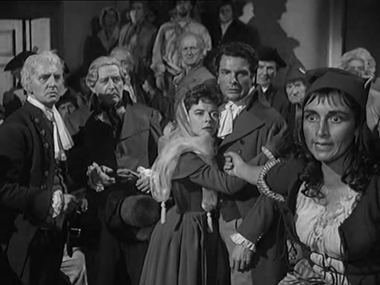
The two cities in question are Paris and London, but the story itself begins in neither of them – instead, it begins on a dark night in the English countryside. A mail coach, stuck in the mud, is hailed by a lone rider, who has a message for one of the passengers. The passenger is a Mr Lorry (Cecil Parker – a coincidence on this blog, since he also acted in the last film I reviewed). Mr Lorry works for a bank named Tellson’s, with branches in London and Paris.
The messenger is Mr Lorry’s servant, Jerry Cruncher (Alfie Bass). He hands over a note which makes Mr Lorry excited.

Mr Lorry sends Cruncher off with a short verbal message – “recalled to life” – and gets back into the coach, where there’s another passenger. This is a young advocate, a wastrel and a drunkard named Sydney Carton (Dirk Bogarde).
The coach, once freed of the mud, goes on to its destination, Dover. Mr Lorry and Carton take rooms in the inn, and Mr Lorry also reserves one for a young lady who will be arriving in the evening.
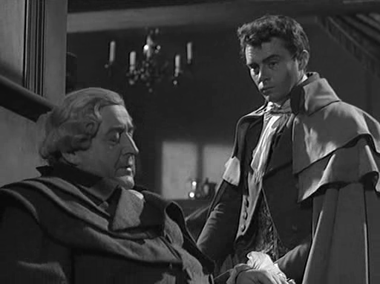
The young lady – Lucie Manette (Dorothy Tutin) – arrives by the evening mail coach, accompanied by her companion Miss Pross (Athene Seyler). Also in the coach is a shifty-eyed man, and a handsome young gentleman named Charles Darnay (Paul Guers). Darnay and Lucie have become friends during the journey, and when they part ways at Dover, it’s with the hope – on both sides – that they will meet again.
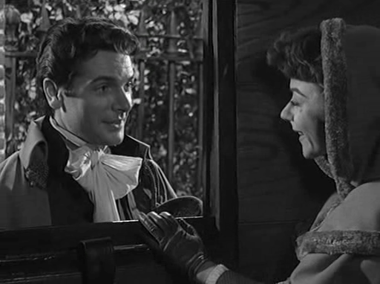
Later that evening, Mr Lorry has a meeting with Lucie Manette. It turns out that Mr Lorry has been Lucie’s guardian for the past 18 years, ever since her English-born mother and French father died.
Mr Lorry now tells Lucie the horrifying tale of her father’s supposed death. This story, he says, has come to him from Defarge, the former servant of Lucie’s father.

He says that 18 years ago, Lucie’s father, a distinguished surgeon named Dr Manette (Stephen Murray) was summoned to the chateau of the Marquis St. Evremonde (Christopher Lee). There, Dr Manette found that the patient was a hysterical young peasant woman, who had been brutally gagged and bound to a bed. Despite Dr Manette’s efforts, she died.

While at the chateau, Dr Manette was also taken – on the sly, by the marquis’s steward – to the stables, where a teenaged boy lay dying from a sword wound. The steward and the boy both told Dr Manette of the marquis’s extreme cruelty towards the villagers in his lands. The boy, it emerged, was the brother of the girl who had just died – the marquis had raped her.
Just as he was dying, the boy told Dr Manette that he had another sister, just 15 years old. He begged Dr Manette to save her from the marquis.

A shaken Dr Manette returned to his house, and decided to write to the authorities about the atrocities committed by the marquis. He also instructed his servant Defarge (Duncan Lamont) to find the girl whose siblings had just died, and to take her away from the reach of the marquis.
Defarge rescued the girl, taking her to his parents to be sheltered; but Dr Manette was not so lucky. The marquis was a powerful man, and had Dr Manette arrested and summarily imprisoned in the Bastille.

But – and here’s the sensational news! – Dr Manette is now free.
That is why Mr Lorry has called Lucie to Dover: they will cross the Channel and go to Paris to get her father. Defarge has been taking care of Dr Manette ever since the doctor was freed.
So they go to Paris and to Defarge’s home – now a wine shop. Defarge had married the girl whom he had rescued. Madame Defarge (Rosalie Crutchley) is bitter, angry and suspicious of just about everybody.

There’s a touching reunion between Lucie and her father, though Dr Manette has lost his wits and is a wreck who spends all his time making shoes. He doesn’t even know his own name – when asked, all he can say is “One hundred and five, North Tower”.
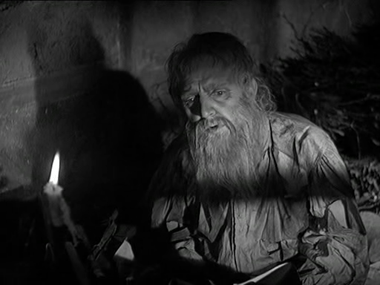
Two years pass, and Lucie’s loving care has restored Dr Manette to the extent that he’s considering reviving his practice.
One day, Mr Lorry comes to visit them, and with bad news: Charles Darnay is accused of being a spy – of handing over important naval documents to the French. Mr Lorry says that he has engaged a lawyer, Mr Stryver (Ernest Clark) to defend Darnay. Mr Lorry himself is of the opinion that the incriminating papers were planted on Darnay.

At the court, Lucie discovers that:
(a) Stryver’s junior is Sydney Carton, whom she had briefly met at Dover two years earlier
(b) The main witness against Darnay is a man named Barsad (Donald Pleasance) – the same shifty-eyed character who had been in the coach travelling with Lucie, Miss Pross and Darnay, two years earlier

Stryver tries, unsuccessfully, to break down Barsad’s evidence, but fails. Even Lucie, called to give evidence, is unable to impress the jury. Success comes only when Carton gives Stryver a suggestion… which is to show that Darnay could well be mistaken for another young, dark-haired man, such as Carton himself:
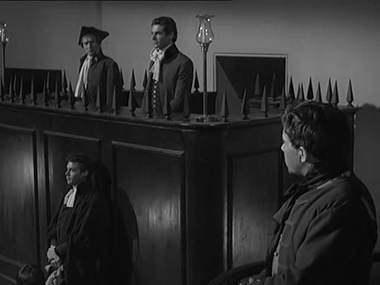
Anyway, Darnay is acquitted, Lucie is very grateful to Carton, and he realises that she is already in love with Darnay – she’d collapsed when she thought her evidence had damned Darnay.
Later that evening, Darnay and Carton have a drink together. Carton is caustic, not particularly fond of Darnay, but he gives Darnay some advice: to be vigilant. Once accused, always under suspicion.
Darnay mentions to Carton that he’s going for a few days to France – to wind up his affairs there once and for all.
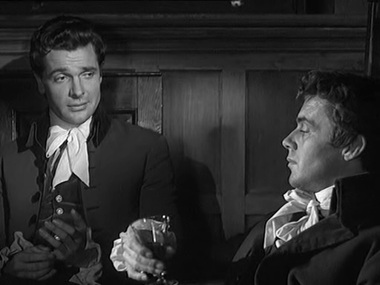
What affairs these are, we soon discover. Charles Darnay is actually the cousin and heir of the Marquis St. Evremonde. Darnay is so disgusted by the tyranny of his cousin (and of the aristocracy in general) that he’s come to let Evremonde know that he’s giving up all his rights to the title and the property. He’s come to the estate merely to gather up whatever few personal belongings he still has there. Then he’ll shift to England for good, and work to earn his living, rather than live off the labour of others.
… and doesn’t realise that his sins are about to catch up with him. That night, as the Marquis is sleeping, a villager (whose son was run over by the Marquis’s carriage, and to whom the Marquis tossed a coin as compensation) enters… in the morning, the Marquis is found stabbed, dead.
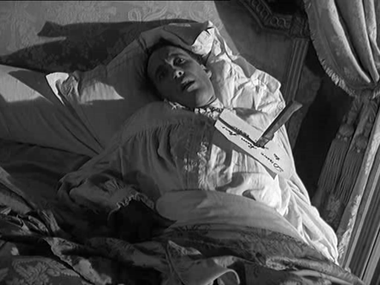
Plenty more happens within the next few scenes.
Carton, drunk and haunting the street outside Lucie’s home, one day falls and hits his head. When she takes him into her home and attends to him, he – still drunk – tells her how much he loves her. And how he would lay down his life for her happiness. And how, if he can ever be of service to her, she shouldn’t hesitate to ask.

He does return, now sober, the next day, to apologise for his drunkenness, and to assure Lucie that his promise – of always helping her, to whatever extent – stands good. As he’s leaving, Darnay arrives. He proposes to Lucie and is ecstatically accepted (of course!).
… and Carton gives them a piece of news: Barsad, who had been the prime witness against Darnay in that case, is dead.

Far away, across the Channel in France, trouble is brewing. The murder of the Marquis St. Evremonde was only the first of the uprisings against the aristocracy. Now the fire is spreading, and who knows where it will spread, and whom it will consume on the way?
What I liked about this film:
I have a theory: when it comes to period drama, the British are hard to beat. I’ve nothing against Hollywood, but the Brits really, really know how to do period drama well, whether they’re making films or TV series or whatever. They excel at it, and A Tale of Two Cities is a good example. The atmosphere is excellent and believable (especially the madness that grips Paris); the story is engrossing; and the acting is good.
Dirk Bogarde as Sydney Carton is especially superb – he portrays the many dimensions of this complex character very well. Seemingly superficial, too fond of his wine, cynical, sarcastic – yet a man with a very sharp mind and a surprisingly unselfish loyalty for the woman he loves – a loyalty that actually knows no bounds.

Ah, and Paul Guers. Darnay’s character doesn’t allow much scope for displaying good acting, but at least Paul Guers looks simply magnifique.
What I didn’t like:
Oddly enough (considering this is a British film), while the exteriors that are set in France generally look authentic and believable, most of the British ones have a distinct look of being sets.
Plus, there is stuff about the story – the rather tangled, complicated plot, and the end (which I don’t like at all)… but those are really not the fault of the film makers. More on that, in the section below.
Comparisons, comparisons:
For anybody who’s been reading this blog long enough: you probably know by now that I’m a purist when it comes to screen adaptations of books. I hate it when perfectly good books are changed – for no rhyme or reason – to fit film makers’ expectations of what a good film (or, more aptly perhaps, a profitable film) should be.
So, I’m happy to say: I thought this one a good adaptation of Dickens’s novel. Some changes have been made, of course (Darnay is Evremonde’s cousin in the film rather than his nephew, as in the book; and the entire story has been condensed into a little over two years, rather than the twelve or so years that the book stretches over).
Those are changes, however, which don’t really affect the story that much, and are probably more suitable for screen. Dickens’s novel uses lots of description to fill out the space between the years and to generally meander over time – since the film chooses to be more fast-paced, I didn’t mind it being a more condensed version.
What did puzzle me about the film was why certain episodes were moved around. In the novel, for example, the fact that Madame Defarge was the sister of the one raped and killed by Evremonde isn’t revealed till almost the end. Similarly, the back story – of why Dr Manette was imprisoned – appears close to the end. By bringing both revelations right to the beginning of the film, two vital secrets are revealed right at the start.
Despite that, this is a worthy adaptation. True, I couldn’t (naturally) get the full flavour of Dickens’s inimitable humour, but – I found myself feeling for Sydney Carton and his doomed love. I was horrified by the unfeeling, single-minded madness of Madame Defarge. And I could both feel angry at the aristocrats, and be sickened by those who sent even innocent people blithely to the guillotine.


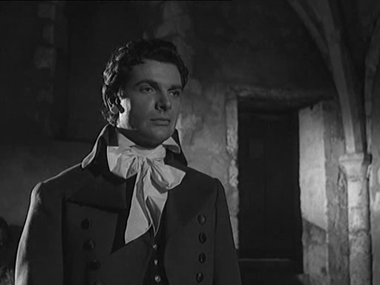
I remember reading a quote attributed to some profressor of literature who said “War and Peace is one of those books you have to read before you die, so the longer I put it off, the longer I live.” It’s almost certainly apocryphal but is my rationale for not having read any of Dickens and having no plans to start. So if you say this is a good adaptation then, despite being neither the best of films nor the worst of films, it shall do me nicely. Thanks!
LikeLike
I hadn’t heard that quote about War and Peace, but I can sympathise with the person who said it – it’s the reason I’ve never got around to reading it! My mum did her MA in literature, and had all these books – Dickens (of course), the Brontë sisters, Thomas Hardy, and even the unbeatably depressing Dostoevsky. The only Dickens novel I’ve read in its unabridged form is A Tale of Two Cities. It drags a bit because there’s a lot of description, plus the language – especially the dialogue – is (naturally) rather outdated.
One recent Dickens adaptation I’ve seen that I liked was the 2008 BBC TV series of Little Dorrit, starring Claire Foy, Matthew Macfadyen and Andy Serkis – depressing, of course, but at least it ended happily!
LikeLike
stuart, I read War and Peace; it was just too long. :) Madhu, do try Great Expectations and The Pickwick Papers for a start with Dickens.
Little Dorrit and The Old Curiosity Shop were the least favourites, as far as I was concerned. As you may have guessed, I did my Masters in English Literature too. :))
LikeLike
Anu, I’d been meaning to review War and Peace, and (since I always try and compare the book – if it’s a well-known one – to the film), I’d been meaning to read the book before that. Just the size of it is daunting enough! Maybe that’s going to go on the back burner for a while. ;-)
I’ve read an abridged form of Great Expectations, and I’ve seen a TV series – and I’ve read bits of The Pickwick Papers. Will begin with the original, complete versions whenever I get the time, now that you’ve recommended them!
LikeLike
Totally avoid the abridged forms, they give you the story but nothing of the immense pleasure of minute and insightful observation!
LikeLike
I would never read an abridged version now. The abridged versions I’m talking about, I read when I wasn’t even a teenager – I wouldn’t have understood half the words if it hadn’t been for the fact that it was an abridged version.
LikeLike
Over the past year or so I have re-read all the Dickens I read as a teen, plus most of the ones I hadn’t read, and it is such a pleasure! The reading is in so many layers, the story, his take on human nature, British society, contemporary issues (an amazing number of which could actually be talking about Now as opposed to 150 years ago).
And I look forward to re-reading them again so; every time you discover some new joy or laugh out loud at some or the other observation.
@Madhu, read a short excerpt from Little Dorrit that I posted on my fb notes, and see if you don’t think it is Parliament today he is talking about!
LikeLike
I’ll have a look at your FB notes, bawa – I haven’t read Little Dorrit, but I can imagine how Dickens might describe something in a way that would’ve made as much sense today as it did 150 years ago. When I was reading A Tale of Two Cities, that delightful section about Monsieugneur’s daily chocolate ritual had me laughing because it sounded so much like so many Indian politicians!
LikeLike
Here is a link to Chapter 10 from Little Dorrit: “Containing the Whole Science of Government”
The Circumlocation OfficeTEXT
LikeLike
Enjoyed that, bawa! Sounds so much like Indian government offices, no? ;-)
LikeLike
Thats what I thought! But it also looks like anywhere in the world really, the amount of tape is still incredible…
LikeLike
I have been reading A Tale of Two Cities right from childhood and every reading seems to invigorate me.
And to this was added the pleasure of seeing this in the form of a movie from around end of ’60s, at least once every ten years.
LikeLike
Since the time I saw somebody enact the Title Tale of Two cities with a tail. I can’t just help but think of two cities sharing a common tail!
LikeLike
Whaaat?!
Okay, I’m completely flummoxed. Tell me more about this, please!
LikeLike
I forgot to add that it was in a game of dumb charades. One group has to enact the title of the film Tale of the two cities and the guy started with the word tale and showed it as a tail.
I shouldn’t press the post comment button so fast! ;-)
LikeLike
:-D :-D
Hehe. That’s a good one. Imaginative, too!
LikeLike
Lovely write-up, Madhulika. You say British are the best at making period films. Talking of period films, where should we place Merchant Ivory?
LikeLike
Thanks, Hansda! I actually haven’t too many of Merchant-Ivory’s period films: only A Room With A View (which I loved), so I can’t comment on that.
But when I say that the British are really good at period films, I’m thinking especially of some of the great TV adaptations I’ve seen over the years: Pride and Prejudice, North and South, Daniel Deronda, Wuthering Heights (the one that had Matthew Macfadyen as Hareton Earnshaw), and so on. Also some movies: this one; Far From the Madding Crowd (the Julie Christie version); and… oh, so many more.
LikeLike
Incidentally (since I’m so fond of historical detective fiction): also the simply superb Mystery!: Cadfael series. They’re fantastic.
http://www.imdb.com/title/tt0108717/
And, now that I think of it, TV series like the Jeremy Brett Sherlock Holmes or the Hugh Laurie-Stephen Fry Jeeves and Wooster are also period series – and they’re both absolute classics.
LikeLike
Dustedoff, there’s now a period soap called Downton Abbey that’s taken the US by storm – if it ever comes to India (as I’m sure it will), do watch it – excellent production values, a tight script and all-round good acting.
ps: Agree with you about the Brits beating Hollywood hollow when it comes to period dramas.
LikeLike
Ah, I’ve seen Downton Abbey mentioned on IMDB – will keep an eye out for it, though I doubt if I’m likely to run into it, since I don’t watch TV. Will let my husband know, so if he’s channel-surfing, he can keep an eye out for it.
LikeLike
Madhu, it’s available on DVD. Season 1 was made available last year, and Season 2 has just come out in that format.
LikeLike
I wish it were easier to get TV series on DVD in India – all they seem to have is stuff like Friends. Maybe I’ll order this on Amazon the next time I have friends or relatives coming to India.
LikeLike
I did watch one version of A Tale of Two Cities many years ago. I love this novel, there is plenty of drama to fill a movie, And you are right, Brits are best when it comes to making movies out of classical literature. Think of all those marvellous BBC series on the novels of Jane Austen, North and South (Elizabeth Gaskell), the Sherlock Holmes series. I don’t there is ANY Dickens novel that was not turned into a film or a TV series.
LikeLike
Yes, I don’t think they’ve omitted any Dickens novel – in fact, most of them have been filmed or turned into TV series multiple times.
Don’t you love the BBC series of Austen’s works and North & South? Simply superb. I like the fact that the Brits are so good at cutting out the clutter without tampering with the story. The ‘feel’ comes through invariably excellently.
LikeLike
I think I last read the Tale of Two Cities in school and most probably an abridged version.
Nice write up again, Madhu! It was a pleasure to read it. Makes me want to watch the film!
LikeLike
Thanks for the appreciation, Harvey!
The abridged A Tale of Two Cities was also my introduction to Dickens. Didn’t read it at school, but we had a copy at home – our ‘kiddies’ copy’ as opposed to our mum’s copy! I didn’t like it much, because the end was too depressing for me.
LikeLike
My introduction to Charles Dickens was the abridged versionn of OliverTwist in the sixth class. I was nearly in tears, but the happy end, consoled me.
You know, it was the time when Billa and Ranga (the two famous child kidnappers) were at large and I lived in a mortal fear that I would be kidnapped and forced to beg on the streets. :-D
LikeLike
: -D
Your imagination is quite astounding, Harvey! Billa and Ranga indeed.
You know, this reminds me of something amusing. My cousin’s husband, Abhi bhaiya is tall and thin and has a beard. Back in the 80s (or whenever Billa and Ranga were at their worst), Abhi bhaiya used to teach at Gwalior’s Scindia school. One evening, he and another teacher – who was short and fat – came into town from the school to have dinner and watch a late-night film. By the time they finished, it was quite late and the town was mostly deserted. They were looking around for transport back to the school when a havildar saw them and immediately thought they were Billa and Ranga! No matter what they said, he refused to believe them and arrested them.
Eventually, they were released from the police lock-up only after someone from the school (I think the principal) came and identified them.
LikeLike
” : -D Your imagination is quite astounding, Harvey! Billa and Ranga indeed.”
*in a reproachful tone* You can be amused for all you want, you are after all related to them! I lived in mortal fear of them. On my way back from school I didn’t as much as look at a man, forget talk to one. :-) It was very amusing to discuss with friends about B & R ‘ s latest exploits and our strategies of defence and assault! :-D
Now I can laugh, but at that time it was all very serious! :-D
LikeLike
:-D :-D
LikeLike
Your reviews makes one really feel like going out in searchof it. Thanks for this.
I’m glad you’ve honoured Charles Dickens. There is a lovely google design today.
I was introduced to him in class six and it was an excerpt from Oliver, the asking for *more* part, followed by DavidCopperfield excerpt headed ‘Donkeys at Dover’….the fact that I remember this points to the profound impression it left on me and I really became an ardent fan.
I’m not a literature graduate, but read classics avidly.
Wanted to read all started with the very fat Pickwick papers. His sense of humour was a quiet one. One had to really notice it.
Tale of two cities was quite intriguing. Haven’t watched a single adaptation of it though.
And yes. The Brits are great with classics. It’s their heritage after all, and they understand it not forgetting the ready made locations present at hand. I’m surprised they used sets in this adaptation. Even their Shakespeare (with a more modern look) are good.
I love their musical Oliver!!
Thank you for this post DO. Gave one the chance to reminisce.
LikeLike
Thank you, pacifist!
I saw the Google doodle for Dickens’s bicentennary today – yes, nice one. In fact, I hadn’t realised it was his 200th birthday until a few days ago, and decided I had to honour Dickens on my blog, because there are so many films based on his books. A Tale of Two Cities was one I had, besides Oliver!, but since I’d already watched this, I thought this might be easier to review at short notice. But now that you’ve praised Oliver! I must go watch that too…
Like Harvey, the first Dickens I read was an abridged version of A Tale of Two Cities – I was too small then to appreciate Carton’s sacrifice, so thought it unbearably depressing!
LikeLike
Oliver is my favourite musical, but of course it’s condensed a lot and the ending…..well. But it is a great great musical.
A foretaste of it’s music – showing Fagin (and his boys) teaching the young Oliver to pickpocket.
LikeLike
I remember, when I was about 13 or so, there used to be this afternoon programme on AIR, which was devoted to songs from English films. This one was a hot favourite on that, and both my sister and I loved it! We’d learnt the words of quite a bit of it. :-)
LikeLike
I’m not a literature graduate, but read classics avidly.
pacifist, You don’t have to be one to do the other. :) People who liked to read end up reading whatever they can get their hands on, no?
I think most of us who grew up around the same time sort of grew up with the classics; I know I did. I read Great Expectations as a kid because it was my twin siblings’ ‘non-detailed’ book .
I don’t even know if we thought of it as ‘classics’ as opposed to popular fiction or something else. Did you? When I was a kid, the only ‘genres’ I knew were ‘fiction’ and ‘non-fiction’.
ps: Being a literature student spoilt some of the books for me – by the time we finished parsing, construing and analysing every line written, I wanted to throw the books out of the window!
LikeLike
I agree with you about not classifying books as ‘classics’ or not. In fact, just the other day, I was at a book launch – the book was a chick lit one – and the conversation veered into the whole issue of literary fiction versus popular. Plus, of course, the snobbery associated with literary fiction… as someone who writes popular fiction, I can quite understand that snobbery: I’ve been subjected to some pretty insulting comments.
LikeLike
I love reading popular literature *only* if set in the past with wonderful characters like Muzaffar Jang. :)
I have this strange fascination for the past which minimises my interest **in reading** books about what’s going on in the present which is…well, so commonplace LOL!
LikeLike
“I love reading popular literature *only* if set in the past with wonderful characters like Muzaffar Jang. :)”
Thank you, pacifist! That’s very sweet of you! *hugs*
You know what? I agree with you completely about reading popular fiction that’s set in the past. Most of my reading is confined to historical detective fiction, and even when I try other types of fiction, it is invariably set in the past. Somehow, I don’t read too much fiction that’s set in the contemporary world. You’re right – too commonplace!
LikeLike
“Being a literature student spoilt some of the books for me – by the time we finished parsing, construing and analysing every line written, I wanted to throw the books out of the window!”
That’s interesting. I never studied literature except in Class XI and XII, so we didn’t go that deep. Surprisingly, though, the classics we did study in those two years – including Far From the Madding Crowd and Julius Caesar – remain among my favourites. And I’ve always maintained that my love for those was because I studied them.
LikeLike
That’s true. I didn’t read these books as classics, just ‘books’. Under the name of the author, yes. In our school library we had shelves well labelled with their names – and not ‘classic literature’
LikeLike
pacifist, exactly! And add me to the historical fiction (and non-fiction) camp. :)
Madhu, the problem is when you are taking a class in ‘Critical Analysis’ (and it’s not like you have a choice!), then you are analysing everything https://dustedoff.wordpress.com/2012/02/07/a-tale-of-two-cities-1958/#comments to the end of your life. It’s like Robert Frost and the ‘Miles to go before I sleep’ poem – which almost everyone interprets as having to achieve something before death. And poor Robert Frost once said (and that is always forgotten when they analyse the poem even today) that all he meant was that he had miles to go before he could sleep! Literally. that.
This may interest you – a modern author’s take on analysis.
http://archive.hbook.com/newsletter/archive/2011/notes_mar11.html
and a poem on the subject:
I ask them to take a poem
and hold it up to the light
like a color slide
or press an ear against its hive.
I say drop a mouse into a poem
and watch him probe his way out,
or walk inside the poem’s room
and feel the walls for a light switch.
I want them to waterski
across the surface of a poem
waving at the author’s name on the shore.
But all they want to do
is tie the poem to a chair with rope
and torture a confession out of it.
They begin beating it with a hose
to find out what it really means.
Billy Collins
LikeLike
I loved that poem, Anu – and that interview about DAM! :-) I could totally understand it; till date, my favourite poems are stuff like Ulysses, Macavity the Mystery Cat, Ozymandias and The Charge of the Light Brigade – all mainly because of their rhythm, not because there was deep emotion there that I discovered after having analysed them.
And I didn’t know about …and miles to go before I sleep being so utterly mundane.
I was reminded of a book club meeting I was invited to. They read out a poem and asked everybody attending to analyse it and say what the poet was, in their opinion, trying to say. Dead silence. :-(
LikeLike
Late as usual and by now I guess you know why I take these breaks from cyberspace – yes of course my health– as for Tale of Two Cities, like Harvey it was the abridged version which we were compelled to read back in school, I do not remember whether I finally did finish it. We did have the unabridged version at home but I never got down to reading it, mainly because by the time I grew up I had moved from fiction to non-fiction reading and I plead guilty to being an avid reader of non-fiction.
Be that as it may I totally agree with you, I too cannot forgive filmmakers when they make unnecessary changes, for instance I still haven’t forgiven Satyajit Ray for ruining the end of Munshi Premchand’s Shatranj Ke Khilari, the appeal of the short story lay in the way Premchand ended the story.
LikeLike
Unfortunately, I don’t remember reading Munshi Premchand’s story, and it’s been so long since I watched Shatranj ke Khiladi, I don’t remember how it ends – even though I do recall some bits of the film. But another example of a film whose story was inexplicably mangled was the 1940 (? not sure of the year) Pride and Prejudice starring Laurence Olivier – it was simply unpardonable.
LikeLike
*groan* *groan* re: Pride and prjudice 1940 (it ‘is’ 1940 – I have the DVD……. ‘shhhh’)
LikeLike
Shudder. It was horrible, wasn’t it? I remember, the first time I watched it was when I was a young teen and very deeply in love with the book. I was looking forward eagerly to the movie because I knew it starred Olivier. And then to see this travesty…. ewww.
LikeLike
Oh yes. The ending didn’t have the punch the short story did. It was the high point of what the writer wanted to convey and by ending it the way Satyajit Ray did, it just turned mundane.
LikeLike
Now I have to read the story and watch the film. Where on earth am I going to find the time??!
LikeLike
I have beenintending to watch Shatranj ke Khilari since years, but never managed it. I would love to watch Kurosawa, Ray, Hitchcock, Truffant in a row and compare them with each other. If we all were in one town, we could have founded a film club! :-)
LikeLike
Even if we can’t form a film club, I think the idea of watching these great directors all in a row and comparing their techniques would be a great idea! Do, harvey, do. Please! Would love to see your take on them.
LikeLike
Oh, the idea of the film club sounds wonderful!!
pacifist, now you have made me want to look up Premchand’s story, and re-watch Shatranj ke Khiladi! Where, oh where is the time??
LikeLike
This tale was simply mindblowing, isn’t it?
LikeLike
It was! And Bogarde’s acting is superb.
LikeLike
Just llike Shilpi, I also have turned in the last few years to non-fiction. Maybe it is my age showing! The last fiction I read, I think was Adiga’s The White Tiger’.
LikeLike
No, it was K. Abbas’ collection of short stories. I hope my next will be The Eighth Guest
LikeLike
:-)
LikeLike
I remember going to the Delhi Book Fair two years back. There, at the Hachette stall, I met someone with whom my parents were slightly acquainted. He asked me what I was doing these days, so I told him I was a writer. When I told him I’d written a novel, he sneered at me and said, “Oh, I’m past the age of reading fiction!” Not very polite.
Why I did mention this was that I think it’s difficult to arbitrarily label fiction or non-fiction as necessarily ‘good’ or ‘bad’. Even though I read a lot of fiction, I admit that some of my favourite writers – like Bill Bryson, Gerald Durrell, Peter Mayle, or James Herriott – are/were writers of non-fiction. There’s no end of bad non-fiction out there, and no end of both good and bad fiction.
I guess each book must be evaluated for what it is, not what category it happens to fall into.
BTW, how was The White Tiger? I’ve heard very mixed reviews of it.
LikeLike
Madhu, when I meant that it is my age showing, I didn’t mean to be impolite. I am sorry if I gave you that impression. What I meant was that, now I find that due to my job and interests, I have and love to read non-fiction. But that doesn’t mean at all that non-fiction is better than fiction. Each and every genre has its place in my life for me. If I want to unwind, there is nothing like Wodehouse for that. It would be pretty dumb of me to say that reading Jean Ziegler or Noam Chomsky is better than reading Wodehouse. Both have their place in my life.
I loved reading The White Tiger. It left me with a dark brooding afterwards though!
LikeLike
Arre, no, no, no. No! I certainly didn’t mean that you or Shilpi were being impolite or anything of the sort.
What I find irritating is when people – like that man at the book fair – arbitrarily assign categorise all fiction as frivolous and below their dignity, and all non-fiction as ‘good’. Personally, I think each book should be judged on its own merit. In any case, what really got my goat was that I’d just told this man that I’d written a novel. I wasn’t telling him to buy it, so even if he didn’t read fiction, he could have kept quiet about it. I thought it was rude of him to say that to me. And his tone was really, really contemptuous. :-(
LikeLike
Don’t you see Madhu? I can- the man suffers from some kind of complex and also a bit of envy that you have the ability to write books. You know in Bombay we have a phrase in Hindi which is’ Bhav Dena’ so this man did not want to give you bhav., just forget it. Such people do not even deserve your anger.
BtW, love the film club idea and yes Pride and Prejudice along with Tagore’s The Wreck and Gora will remain my all time favourites.
LikeLike
Oh, Shilpi – you are so sweet! Thank you – you’re so supportive. Yes, I think this man was trying very hard not to give me any bhaav (not that I was even attempting to khaao any bhaav!
I’m unfamilar with both The Wreck and Gora. Goodness, one lifetime is not enough to read a tenth of the books, or watch a tenth of the movies, I want to.
LikeLike
Didn’t I once say that we need about three or four of us, but you, if you remember, spoiled the fun by saying that we need money to maintain so many of ourselves, alas…. can’t even dream, oh but why not my dad used to say — “What is the harm in dreaming? You do not have to pay income tax for your dreams.”
LikeLike
I love that quote from your father, Shilpi. I am so looking forward to your website/blog about him.
And yes, get well soon!
LikeLike
I happened to read the book very recently and was immediately transferred back to my childhood days. This was the trigger for me to catch up on Oliver Twist, Sherlock Holmes and so many other characters which we used to gorge on :-)
I happened to see the house where Charles Dickens wrote many great books (including this one) at Marylebone, near Baker Street Station, London. The characters were etched in the building. Not sure if I do remember them now…..
LikeLike
That’s interesting, about seeing Dickens’s characters etched on the building!
One thing I like about Tube stations in London are the way they’ve tried to incorporate popular images into the decor of the station, wherever possible – like the Baker Street station has Holmesian images, Paddington has Paddington bear all over the place, and so on. Cute!
LikeLike
I tried reading the unabridged version once, but I find it really hard to read these classics. Seems like it would be a good idea to watch this movie first, and then try reading the book.
LikeLike
Actually, it requires a certain frame of mind – and a certain amount of patience – to read a book like this. The language is quite different, and the style of writing is quite different, from modern books. The pace is also slower. In fact, if you watch the film, you may find the book a little too slow.
LikeLike
I had never heard of ‘Billa and Ranga’ before, but I have a similar childhood memory. In the sixties in the U.S there was a serial killer at large known as “The Zodiac Killer” One day our fourth grade teacher, unwisely and irresponsibly I think ,told us all about it, and for days we walked to and from school fearful that he would jump out from behind a tree and catch us. Children everywhere have the same feelings and fears. I’ve seen the MGM version of “Tale of Two Cities” (1938 ?) and thought it was very good, but I have not read the book. We read “Great Expectations” in school and I liked it. In our family we had all of Dickens’ works compressed into one volume in extremely tiny print. I remember struggling through “Dombey and Son” in it. I think ‘Oliver!’ was the first movie I went to see by myself. Sorry to be so rambling, but I love your blog and thanks for letting us share memories!
LikeLike
The first I got to know of Billa and Ranga was when they were spoofed in a comic strip in my favourite children’s magazine, Target (alas, now long defunct). I went through a few years of childhood associating Billa and Ranga with two wannabe crooks who never quite manage to pull it off! But when I was about 13 or so, two young teenagers – a girl and her brother – were kidnapped and killed while trying to hitch a ride not too far from where we lived in Delhi. That was big, horrible news for a long time. I’d never hitched a ride till then, and that certainly put me off hitching rides for the rest of my life!
I’ve never even heard of Dombey and Son – will steer clear of it now.
By the way, ramble on all you want. :-) I love listening to people’s stories about themselves and their lives, so you’re actually doing me a big favour by rambling on.
LikeLike
Ooooh, you brought back memories of Target!! My father subscribed to it for me; it even published one of my stories. :))
LikeLike
Did it? Wow. I am impressed! I read Target very faithfully all the years it was published – so I just may have read your story. What was it about?
Yikes. I just realised. See? Our connection goes back to childhood…
LikeLike
Yikes. I just realised. See? Our connection goes back to childhood…
Time to sing our song, Madhu….
The story? It was about a bunch of kids who solve a mystery in their neighbourhood during the summer vacations. The ‘hero’ liked peanut butter sandwiches. LOL (I liked PB sandwiches when I was a child.) I was a kid myself then, and that was one of the few really, really good children’s magazines of the time. (Or of any time, for that matter, I think.) And of course, I was heavily influenced by Enid Blytons; as my sister said when she read the story, “I feel hungry!”
Come to think of it, I wonder where they found time to solve anything – they were too busy eating. :))
LikeLike
Heh. The story sounds very cute – I don’t remember it, unfortunately, but I’d have loved to read it. Would still love to read it.
I think too that Target was by far the best children’s magazine around. It was well-written, well-illustrated, and it didn’t talk down to children. It treated children like intelligent human beings.
LikeLike
I used to have that particular copy of Target for many years, but finally lost it in one of our many moves. Target also used to have a recipe section – for recipes by kids. I remember one recipe for a sandwich which had butter, green chutney, boiled potatoes and potato chips; it ended with ‘Don’t look! Eat!’ I still remember that sentence after all these years. :)
LikeLike
That sounds good! It’s making my mouth water. :-)
Goodness, what’s happening to my blog? Between you and harvey and pacifist, it seems to be gradually veering away into becoming a food blog. Maybe I should watch some foodie cinema now. ;-)
LikeLike
I saw bits & pieces of this one, I have to sit down and see it in its entirety. Also, I have to re-read all these Dickens novels.
P.S. I remember Billa & Ranga, but I was not too spooked by them; the 70’s Poona murders were far more scary.
LikeLike
From what I remember, Billa and Ranga were more active a little further north. Not sure, though… and I haven’t heard of the Poona murders.
LikeLike
this movie is in my top five:)
i really like it!
LikeLike
A little too morbid to be in my top five, but then, I don’t have a top five. Maybe a top hundred would be closer to the mark… :-D
LikeLike
Yea, i just like the end quote and his sacrifice….
“It is a far far better thing that I do then I have ever done, it is a far far better rest I go to then I have ever known!”
Though it made me cry!! :)
LikeLike
Oh, yes – love that one! I remember, the first time I watched this film (I was perhaps 11 years old or so), I ended up feeling pretty weepy too.
LikeLike
“pretty weepy??” I bawled my eyes out LOL and that is rare for me in watching movies!
LikeLike
Hehe. I rarely cry when watching a film – and never did, even when I was a kid. Offhand, the only film I remember mostly crying through was a Chinese film named Bubbling Spring. I watched it with my parents and my sister when I was about 11 or 12 – and, except for my father, the rest of us were all crying our eyes out!
LikeLike